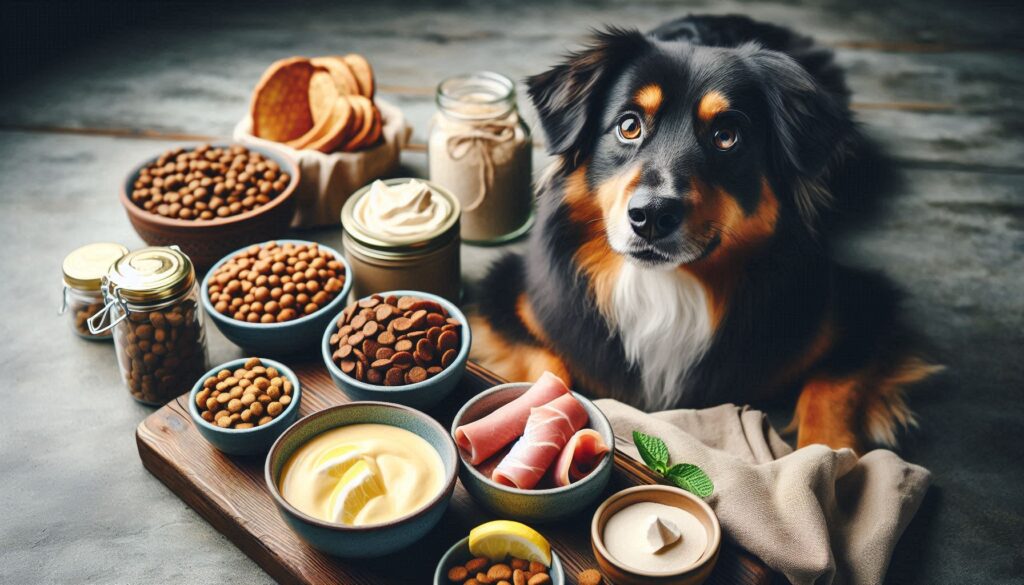As a devoted dog parent, finding the perfect meal for your four-legged friend can sometimes feel like searching for a needle in a haystack. This is especially true when your furry companion has a discerning palate and a sensitive tummy. Fear not! In this comprehensive guide, we’ll explore the ins and outs of choosing the best dog food for picky eaters with sensitive stomachs, ensuring your pooch stays healthy, happy, and satisfied.

Understanding Your Dog’s Dietary Needs
Before diving into specific food recommendations, it’s crucial to understand why your dog might be a picky eater with a sensitive stomach. Several factors can contribute to this, including:
- Breed Predisposition: Some breeds, like Yorkies and Chihuahuas, are notorious for being finicky eaters.
- Past Experiences: Previous encounters with low-quality or spoiled food can make dogs wary of new meals.
- Medical Conditions: Underlying health issues, such as food allergies or gastrointestinal problems, may cause sensitivity.
- Emotional Factors: Stress, anxiety, or changes in routine can affect your dog’s appetite and digestion.
Understanding these factors will help you make informed decisions about your dog’s diet and lifestyle.
Key Ingredients to Look For
When shopping for dog food suited for picky eaters with sensitive stomachs, keep an eye out for these beneficial ingredients:
- High-Quality Protein Sources: Look for easily digestible proteins like chicken, turkey, or fish.
- Limited Ingredients: Fewer components mean less chance of irritation.
- Probiotics: These beneficial bacteria support digestive health.
- Prebiotics: Fiber sources like chicory root can promote good gut bacteria growth.
- Natural Anti-Inflammatory Ingredients: Items like turmeric or ginger can soothe sensitive stomachs.
Top Picks for Sensitive Stomachs
While every dog is unique, here are some highly-rated options that cater to picky eaters with sensitive stomachs:
- Hill’s Science Diet Sensitive Stomach & Skin: This formula is specially designed for adult dogs with digestive sensitivities.
- Royal Canin Gastrointestinal Low Fat: Ideal for dogs needing a low-fat diet due to pancreatic or digestive issues.
- Purina Pro Plan Focus Sensitive Skin & Stomach: Contains easily digestible salmon as the primary protein source.
- Blue Buffalo Basics Limited Ingredient Diet: Perfect for dogs with food sensitivities, featuring a single animal protein source.
- Merrick Limited Ingredient Diet: Grain-free options with a single source of animal protein and easily digestible carbohydrates.
Remember to transition to new foods gradually to avoid upsetting your dog’s stomach further.
Homemade Options for the Truly Picky Pup
If commercial options aren’t cutting it, you might consider preparing homemade meals for your furry friend. However, it’s crucial to consult with a veterinary nutritionist to ensure you’re meeting all of your dog’s nutritional needs. Here’s a simple recipe to get you started:
Chicken and Rice Bowl
- 2 cups cooked, boneless, skinless chicken breast
- 1 cup cooked white rice
- 1/2 cup steamed carrots
- 1/4 cup plain, low-fat yogurt
- 1 tablespoon olive oil
Mix all ingredients and serve in appropriate portions based on your dog’s size and activity level. Remember, homemade diets should be supplemented with essential vitamins and minerals as recommended by your vet.
Tips for Encouraging Picky Eaters
- Stick to a Feeding Schedule: Consistent meal times can help regulate your dog’s appetite.
- Limit Treats: Excessive treats can spoil your dog’s appetite for regular meals.
- Make Mealtime Fun: Use puzzle feeders or interactive toys to make eating more engaging.
- Add Flavor Enhancers: A splash of low-sodium chicken broth or a sprinkle of nutritional yeast can make food more appealing.
- Warm It Up: Slightly warming the food can enhance its aroma and palatability.
The Importance of Hydration
For dogs with sensitive stomachs, proper hydration is crucial. Ensure your pup always has access to fresh, clean water. If your dog is reluctant to drink, consider these strategies:
- Use a pet water fountain to encourage drinking.
- Add a small amount of low-sodium chicken broth to their water.
- Offer ice cubes as a fun, hydrating treat.
Exercise and Digestion
Regular exercise not only keeps your dog healthy but can also stimulate appetite and aid digestion. Aim for at least 30 minutes of physical activity daily, adjusting based on your dog’s age, breed, and health status. Remember to wait at least an hour after meals before vigorous exercise to prevent bloat, especially in large breeds.
When to Consult a Veterinarian
While picky eating and occasional stomach upset can be normal, persistent issues warrant a trip to the vet. Seek professional help if you notice:
- Significant weight loss
- Chronic diarrhea or vomiting
- Lethargy or loss of interest in activities
- Visible discomfort or pain during or after eating
Your veterinarian can rule out underlying health issues and provide tailored dietary recommendations.
The Role of Supplements
In some cases, supplements can support digestive health and overall well-being. Popular options include:
- Probiotics: To support a healthy gut microbiome.
- Digestive Enzymes: Can aid in nutrient absorption.
- Omega-3 Fatty Acids: To reduce inflammation and support skin health.
Always consult with your vet before adding any supplements to your dog’s diet.
Real-Life Success Stories
Many dog owners have found success in managing their picky eaters with sensitive stomachs. For instance, Sarah from DogForums.com shares:
“My Beagle, Max, was always turning his nose up at food and had frequent bouts of diarrhea. After switching to a limited ingredient diet and adding a probiotic supplement, he’s like a new dog! He actually gets excited for mealtime now, and his tummy issues have all but disappeared.”
Similarly, John reports on Reddit’s r/dogs community:
“Our German Shepherd had such a sensitive stomach that we were at our wit’s end. We started making her food at home using a recipe from our vet nutritionist, and the change has been incredible. It takes more time, but seeing her healthy and eager to eat is worth every minute.”
Environmental Factors to Consider
Your dog’s eating environment can significantly impact their willingness to eat and their digestive comfort. Consider these factors:
- Quiet Feeding Area: Ensure your dog can eat without disturbances.
- Appropriate Dishes: Some dogs prefer certain bowl materials or shapes.
- Clean Feeding Station: Regularly wash food and water bowls to prevent bacteria growth.
- Comfortable Temperature: Extreme heat or cold can affect appetite and digestion.
The Future of Dog Nutrition
As our understanding of canine nutrition evolves, so do the options available for our furry friends. Keep an eye out for emerging trends like:
- Personalized Dog Food: Companies like Just Right by Purina are offering customized food blends based on your dog’s specific needs.
- Insect-Based Protein: Environmentally friendly and hypoallergenic, insect protein is gaining traction in the pet food industry.
- Functional Foods: Ingredients that offer specific health benefits beyond basic nutrition are becoming more common in dog food formulations.
Stay informed about these developments to provide the best possible nutrition for your picky eater with a sensitive stomach.
Frequently Asked Questions
To wrap up this comprehensive guide, let’s address some common questions about feeding picky eaters with sensitive stomachs:
1. How often should I feed my dog with a sensitive stomach?
The ideal feeding frequency depends on your dog’s age, size, and specific health needs. Generally, adult dogs do well with two meals a day, while puppies may require three to four smaller meals. Consistency is key for dogs with sensitive stomachs, so stick to a regular feeding schedule. Some dogs benefit from smaller, more frequent meals to ease digestion. Always consult with your veterinarian to determine the best feeding schedule for your unique pup.
2. Can I mix wet and dry food for my picky eater?
Yes, mixing wet and dry food can be an excellent strategy for picky eaters with sensitive stomachs. Wet food often has a stronger aroma and more appealing texture, which can entice reluctant eaters. The moisture in wet food can also aid digestion and increase hydration. However, be sure to adjust portions accordingly to maintain a balanced diet and prevent overfeeding. Start with a small amount of wet food mixed into the dry kibble and gradually increase if needed. Remember to introduce any new food slowly to avoid upsetting your dog’s stomach.
3. Are grain-free diets better for dogs with sensitive stomachs?
The benefits of grain-free diets for dogs with sensitive stomachs are debatable. While some dogs may indeed have grain sensitivities, true grain allergies are relatively rare in dogs. In fact, recent studies have raised concerns about a potential link between grain-free diets and heart problems in some dogs. Unless your dog has a diagnosed grain allergy or intolerance, a high-quality diet that includes easily digestible grains like rice or oatmeal may be perfectly suitable. Always consult with your veterinarian before making significant changes to your dog’s diet, especially if they have a sensitive stomach.
4. How can I tell if my dog’s pickiness is due to a health issue?
While some dogs are naturally picky eaters, persistent food avoidance or sudden changes in eating habits could indicate an underlying health problem. Watch for these signs:
- Consistent refusal to eat for more than 24 hours
- Weight loss
- Vomiting or diarrhea
- Lethargy or decreased activity
- Bad breath or excessive drooling
- Difficulty swallowing or chewing
If you notice any of these symptoms, or if your dog’s pickiness is accompanied by other behavioral changes, it’s crucial to consult with your veterinarian. They can perform a thorough examination to rule out dental issues, gastrointestinal problems, or other health concerns that might be affecting your dog’s appetite.
5. Are there any human foods that can help soothe my dog’s sensitive stomach?
Some human foods can indeed help soothe a dog’s upset stomach, but it’s essential to use them judiciously and under veterinary guidance. Here are a few options that may help:
- Plain, cooked white rice: Easily digestible and can help firm up loose stools.
- Boiled, skinless chicken breast: A lean protein source that’s gentle on the stomach.
- Pumpkin puree (plain, not pie filling): Rich in fiber, which can help regulate digestion.
- Plain, low-fat yogurt: Contains probiotics that can support gut health.
- Boiled sweet potato: Provides easily digestible carbohydrates and fiber.
Remember, these should be given in small amounts and should not replace a balanced diet. Always introduce new foods gradually and stop if you notice any adverse reactions. For persistent stomach issues, it’s best to work with your vet to develop a comprehensive dietary plan.
Conclusion
Navigating the world of dog food for picky eaters with sensitive stomachs can be challenging, but with patience and the right approach, you can find a solution that works for your furry friend. Remember, every dog is unique, and what works for one may not work for another. Don’t be afraid to experiment (safely and gradually) with different high-quality foods and feeding strategies.
Most importantly, always prioritize your dog’s health and well-being. Regular check-ups with your veterinarian, combined with a balanced diet and plenty of love, will go a long way in ensuring your picky eater with a sensitive stomach lives a happy, healthy life.
By staying informed about canine nutrition, being attentive to your dog’s needs, and working closely with pet health professionals, you can transform mealtime from a struggle into a joyful part of your dog’s day. Here’s to happy, healthy eating for your furry companion!


